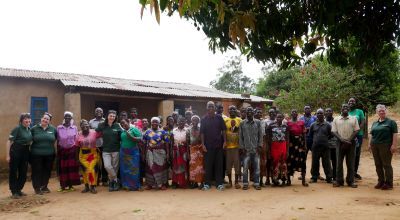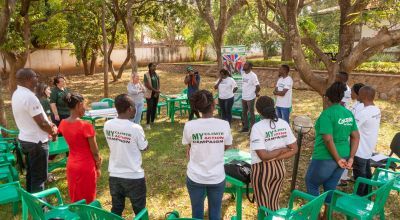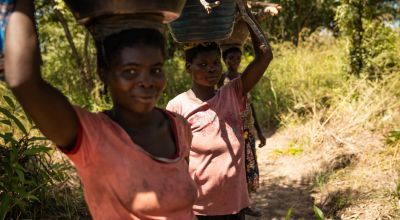
Read our 2024 annual report

Knowledge Hub
In Malawi’s Neno district, near Mwanza, is a small village called Amosi. Men are firing clay bricks to build new homes and walls, while young children happily run around and play outside their houses. In the afternoon, older children in yellow and blue uniforms walk the long road back to Amosi from their school.
Among the villagers is Eliza John Wesele, a 68-year-old mother of seven. When we arrive in Amosi, she warmly greets us with a firm handshake and invites us to sit on a mat she has laid out next to her house. Dressed in bright blue and purple, Eliza has an equally sunny disposition, and welcomes any questions we have about her life in Amosi.
Life hasn’t been easy for Eliza since losing her husband, especially with seven other mouths to feed. Like much of Malawi — where 80% of the population is employed by agriculture — residents of Amosi village depend on agriculture for a living. However, rising prices of produce, fuel and fertiliser, and failing harvests due to poor rainy seasons mean that maintaining an income can be difficult. For Eliza, the biggest issue is lack of money, and trying to make what she has stretch to accommodate rocketing prices.
She said: “I buy food, but it is expensive. Because of the rising cost of goods, things have become very expensive.”
The alternative to buying food is harvesting food she has grown herself. But even when available, this poses problems. At the age of 68, walking the long distance to the farm can be tiring and even painful for Eliza.
The Graduation Approach
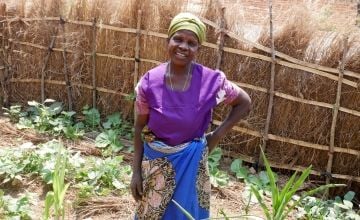
Back in August 2022, when Concern Worldwide visited Amosi village, Eliza enrolled in our Graduation programme. The Graduation programme, first launched in Haiti in 2007, supports people living in poverty with a pathway out of it. The programme provides tailored packages of support to help people address the barriers they face to moving out of poverty – from situations often defined by food insecurity and high levels of vulnerability, towards sustainable livelihoods.
The Graduation approach is an example of a ‘big push’ intervention designed to move people out of conditions of extreme poverty by simultaneously boosting livelihoods and income, providing access to financial services and improving social wellbeing. The approach encompasses four main pillars: social protection, livelihood promotion, financial inclusion and social empowerment; providing income support, technical and business skills training, coaching and mentoring, support to access basic and financial services (savings and loans), and provision of a capital/asset transfer.
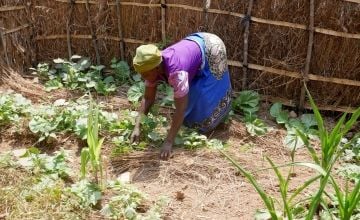
As part of the programme, Eliza was taught how to grow her own home garden. The garden is situated next to her home, walled with bamboo and rushes, and when we visited in October 2022, the plot was full of rows of plants. Eliza is now growing mustard, kale, okra and squash, all without having to travel to the farm to plant vegetables. To increase her output, the team from Concern taught Eliza how to apply fertiliser to enrich the soil, and how to diversify her crops to ensure a varied diet. While Eliza is now able to obtain relish for her meals by walking just a few steps from her door, the home garden doesn’t just provide food for her and her family. She has also been able to sell small amounts of vegetables to neighbours, helping her to buy necessities.
Eliza said: “I get (vegetables) there and sell, and I find money for maize milling and buying soap. If we are hungry, we buy maize to eat, and pay for maize milling. That is how helpful it is. I am able to differentiate now from how I was in the past. Now I see that things are going well.”
Hygiene in the home
Learning about home hygiene is also part of the Graduation programme. Concern installed a tippy tap – a foot-activated tap – to allow Eliza and her family to wash their hands, while a bowl of ashes next to the tippy tap is used instead of soap, which can be expensive.
Speaking about the lessons she learned, Eliza shared: “They taught us that we rub the toilets with clay, use the foot-activated faucet, use a toilet cover. On the foot-activated faucet, we should not put soap because goats eat soap, we should put ashes. When we come out of the toilet, we should take ashes and wash our hands. We should rub our houses with clay, clean our plates and put them on a drying rack. It’s all about hygiene.”
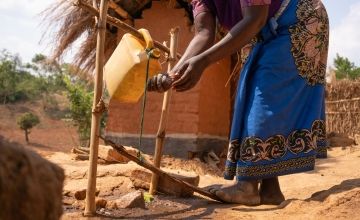
And just a few months in, Eliza can see the difference in her family’s wellbeing thanks to these simple changes. “Infections do not stick around the house, when we follow what the advisors tell us. We see that sicknesses are reduced in the house. The children are also able to take the lesson that, ‘this is the way of living in a house.’ They observe rubbing the toilets with clay, and using the foot-activated faucet. If visitors come unexpectedly and check, they will find the toilet well taken care of. That is the difference.”
However, Eliza says that the cash transfers from Concern have made the biggest difference to her daily life. After a failed harvest, Eliza was struggling to feed her family, but the social cash transfer has given her a safety net.
She said: “For me, the social cash is helpful because, this year, I didn’t harvest any maize. When I receive the money, I buy food for the family, and keep it. Now we are saving to buy fertiliser. The rest of the money is kept for village group savings.”
Visions for the future
Eliza has joined the local Village Savings and Loan Association (VSLA), a scheme in which member’s savings are used to provide loans to the other members. She is attending lessons every Tuesday and Friday with Concern, where she learns about village banking and business skills, and now, Eliza hopes to grow her business and provide for herself and her family without Concern’s assistance.
It will be possible (to be financially independent), with commitment
She explained: “Now with the hunger season that we are approaching, my plans are that once I find the money, I will buy dry fish; I will buy rice. Good things that are necessary for households, so that we can sell them. People will be buying these things because everything has a season.
"This business [selling vegetables from her home garden] is just a trial. The real business is the one we are going to start.
“I want to do business. My vision is developing myself. I don’t have a husband. I am alone. I will be relying on myself, doing what I can. It will be possible (to be financially independent), with commitment. It will be possible.”
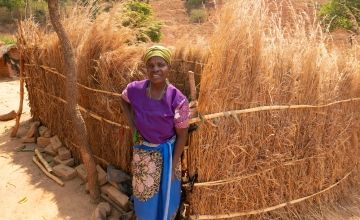
It is clear that Eliza has the drive to work towards her dreams, and she is hoping that her neighbours in Amosi will take a leaf out of her book. While she remains an independent woman, she added that she is grateful for the assistance she received from Concern in setting her off on the right path.
She said: “In the past, we lacked food and even money to buy food. Now we are being helped very much, and there are improvements. (Without Concern) I would have been struggling. I would have been very greatly in need. But they have helped us.
“My life has changed. It has changed indeed because I am not lacking anything in the household. That is the change.”



